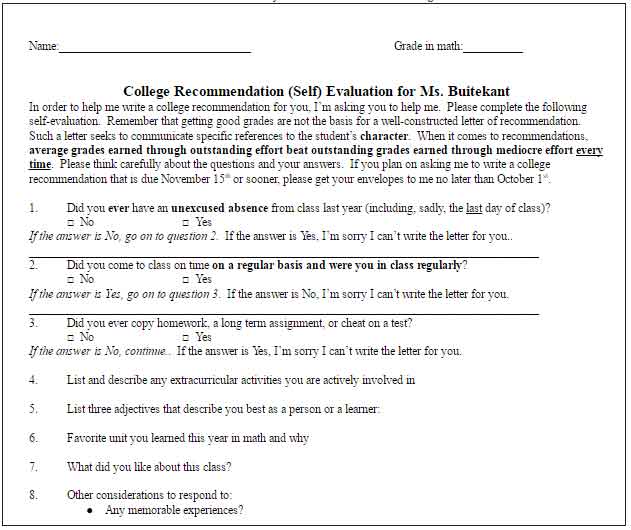Need To Write Recommendation? Use This.

Innovative educators are often asked for letters of recommendation from students as well as colleagues. This can become a little overwhelming if you don't have a few good strategies. Lisa Buitekant, Kris Karlson, Steve Warre, three teachers at Horace Greenley High School in Chappaqua, NY have a useful strategy that others can customize for their needs. They are high school teachers and each year they several requests from students for college letters of recommendations. When they do, they have students fill out a questionnaire evaluation form.
The form requires certain answers to questions to even be eligible to receive a recommendation i.e. they must answer "No" to if they have ever cheated or had an unexcused absence. It also asks students to share their feedback around experiences they had in this teacher's class. The answers provide useful information to include in the recommendation. You may also want to ask students to complete a strength's profile from Thrively which will provide additional useful insights for a recommendation.
For recommendations for professional recommendations, you can change the eligibility and feedback questions to be appropriate for that audience. For example an eligibility questions such as: "Have we ever worked on a professional project together?" I do not write recommendations for those who I have not worked with in an official capacity, so that would be a disqualifying question. A feedback question might be something like "Share what we have worked on together and why you felt it to be a memorable experience." For career recommendations, instead of using a tool like Thrively use one geared toward careers such as Myers Briggs.
What do you think? What is your process for drafting recommendation letters? Do you ask for self-evaluation questions? Are there ideas here you feel would be helpful? Aniy other useful strategies?
Here is a screenshot of the self evaluation and you can see the whole thing here.

For professional recommendations, you can change the eligibility and feedback questions to be appropriate for that audience. For example, an eligibility questions such as: "Have we ever worked on a professional project together?" I do not write recommendations for those who I have not worked with in an official capacity, so that would be a disqualifying question. A feedback question might be something like "Share what we have worked on together and why you felt it to be a memorable experience." For career recommendations, instead of using a tool like Thrively use one geared toward careers such as Myers Briggs.
What do you think? What is your process for drafting recommendation letters? Do you ask for self-evaluation questions? Are there ideas here you feel would be helpful? Any other useful strategies?
Tools and ideas to transform education. Sign up below.
Lisa Nielsen writes for and speaks to audiences across the globe about learning innovatively and is frequently covered by local and national media for her views on “Passion (not data) Driven Learning,” "Thinking Outside the Ban" to harness the power of technology for learning, and using the power of social media to provide a voice to educators and students. Ms. Nielsen has worked for more than a decade in various capacities to support learning in real and innovative ways that will prepare students for success. In addition to her award-winning blog, The Innovative Educator, Ms. Nielsen’s writing is featured in places such as Huffington Post, Tech & Learning, ISTE Connects, ASCD Wholechild, MindShift, Leading & Learning, The Unplugged Mom, and is the author the book Teaching Generation Text.
Disclaimer: The information shared here is strictly that of the author and does not reflect the opinions or endorsement of her employer.
Lisa Nielsen (@InnovativeEdu) has worked as a public-school educator and administrator since 1997. She is a prolific writer best known for her award-winning blog, The Innovative Educator. Nielsen is the author of several books and her writing has been featured in media outlets such as The New York Times, The Wall Street Journal, and Tech & Learning.
Disclaimer: The information shared here is strictly that of the author and does not reflect the opinions or endorsement of her employer.
